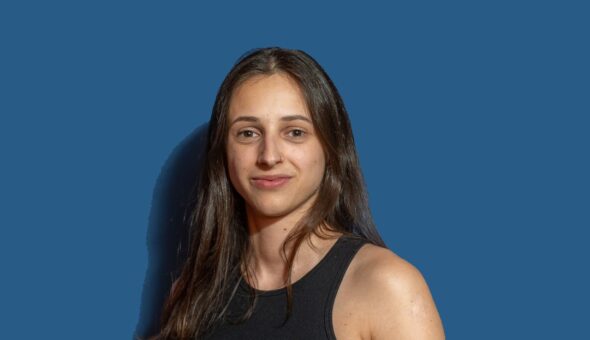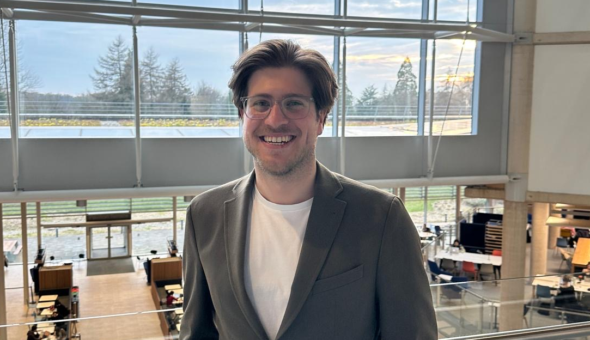Hussain has just finished the first year of his PhD, supported by a Warm Welcome Scholarship provided by the British Council. He tells us about the challenges faced by refugee entrepreneurs, support from our Strategy & Organisation division and why perfection isn’t a prerequisite.
What drove you to choose Bath for your PhD?
I received an offer from the British Council to do any degree at a selection of universities. I was looking for Masters degrees, but I thought, ‘If I'm making this commitment, why not do a PhD?’.
The first meeting I had was online with Professor Nancy Harding, head of the Strategy & Organisation division. She told me that my proposal wasn’t developed enough and needed more work, and said that she was becoming my tentative supervisor straightaway because we didn't have that much time before the deadline.
I had to move down to Bath from Scotland with my heavily pregnant wife, but Nancy was very supportive and the University was really helpful with things like family accommodation.
What is your research topic and how did you decide on it?
My research is about how entrepreneurial activities affect Afghan refugees’ wellbeing. My Masters degree, which I completed at the American University of Afghanistan, was on the challenges that Afghan female entrepreneurs face, so I already had some knowledge around the theme.
What initially sparked your interest in the topic?
It was related to my own history. My supervisor persuaded me to write down my life story, which we then went over. I was born in a refugee family, and I was moved back to my parents’ country – which made me a refugee because I wasn't familiar with the culture. So from there, I had a personal connection to refugee status. My family and I are in the UK, as well, so I'm approaching things from inside that culture.
I thought I may give back to the community by doing research about them and how they're going to overcome these challenges, so my work can offer advice to people in that situation.
What are your findings so far?
I am currently working on my confirmation report, which is the first verbal examination. With the guidance of my main supervisor – Professor Dimo Dimov, who has extensive international experience and is a leader in entrepreneurial thinking – I've developed conceptual models and frameworks about entrepreneurial intention and opportunity recognition. His support and determination have been invaluable.
I am also fortunate to have Nancy, who is a qualitative researcher and ethnographer, as my second supervisor. Both are outstanding academics and leaders.
In my confirmation report, I will outline the context of entrepreneurship, the existing knowledge about refugees and their wellbeing, and how these elements connect. For example, I will explain why some individuals might choose entrepreneurship over waged employment and the consequences of that choice on their well-being, specifically relating this to Afghan refugees in the UK.
I will compare four personas from refugee backgrounds: a basic labourer, a professional worker (transitioned through training or education), a successful but stagnant entrepreneur, and an entrepreneur with a growing business. The goal is to examine how the wellbeing of these individuals differs. Does the scaled-up business owner have better wellbeing than the stagnant one? How does the professional worker's wellbeing compare to the labourer’s?
This overall conceptual framework will demonstrate to the examiners that my research is well-founded, enabling me to proceed with data collection.
How do you hope the findings can be applied in a real-world setting?
Refugees tend to deal with the normal challenges that an entrepreneur faces, but then they also have the added challenges of their refugee status. Coming to a new culture, their self-confidence and autonomy may be knocked down – they have to start from zero, no matter what other qualifications they have from their home country.
They might not have the language skills, nor any knowledge about their new context, so they end up going to the informal job market where they might be exploited and end up in sweatshop conditions. So instead they think, ‘Okay, maybe I'll start my own business’. If they’re good at cooking, they might sell their native cuisine, for instance.
So in that context, their business is also not growing because they don't have access to finance: they can’t get loans or credit, so they cannot get money to expand their business. As a result, they end up primarily targeting their own community, which is not the mainstream, and this is the end of the story for them in terms of expansion.
I hope to alert policymakers to the bigger picture of the issues people face. We need to help these business owners access the financial capital they need to enter the mainstream market. This would also help the overall diversity of the economy, as people bring in different knowledge and different skills.
What advice would you offer to others studying or considering a PhD?
I think the main thing is to be to be ambitious.
I was ambitious, but I wasn't perfect. My English wasn't perfect – it's not my first language. My proposal wasn’t perfect. The timing wasn’t perfect. But I came here and I found that there were resources and people who could help. You just need to be ambitious and then ask for help.
You don’t need to be 100% perfect, because it’s a learning process. That's the point of a PhD: it makes you a better person.
Respond



